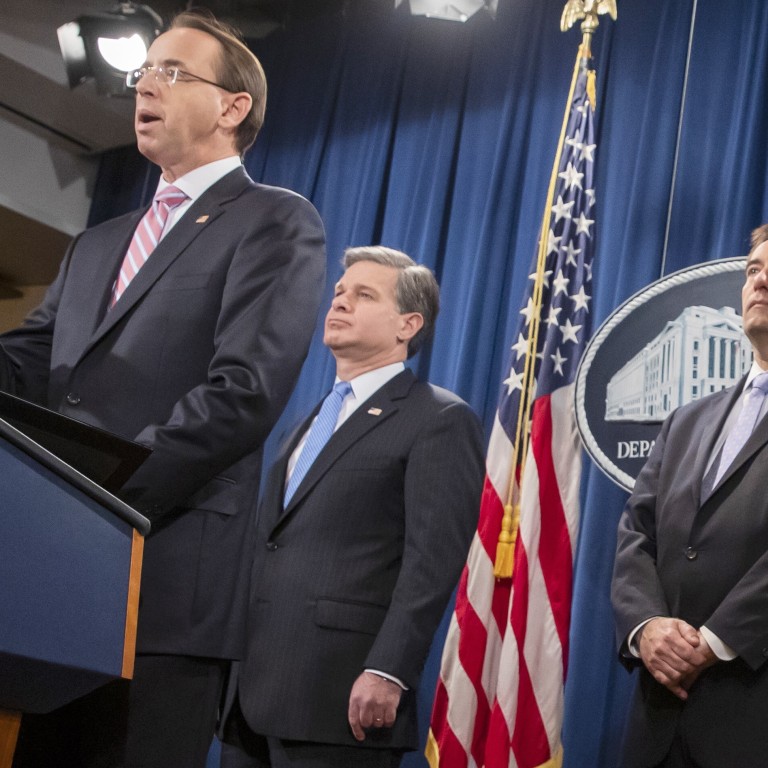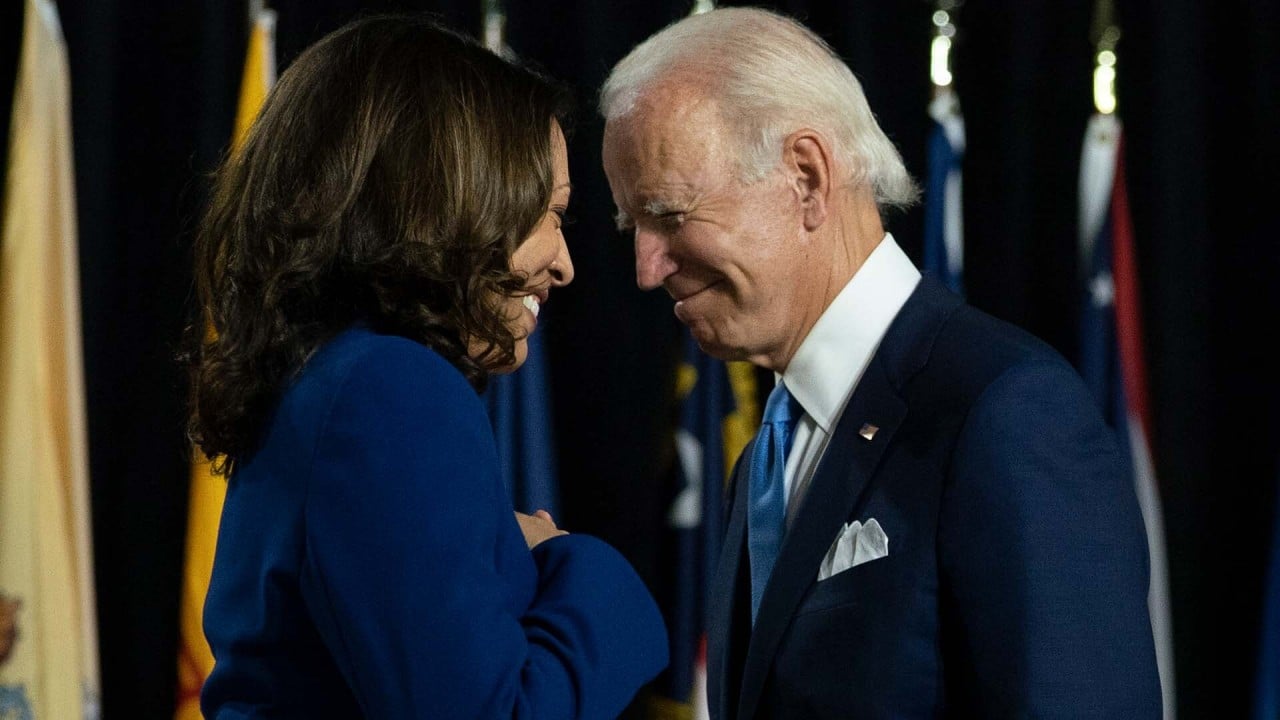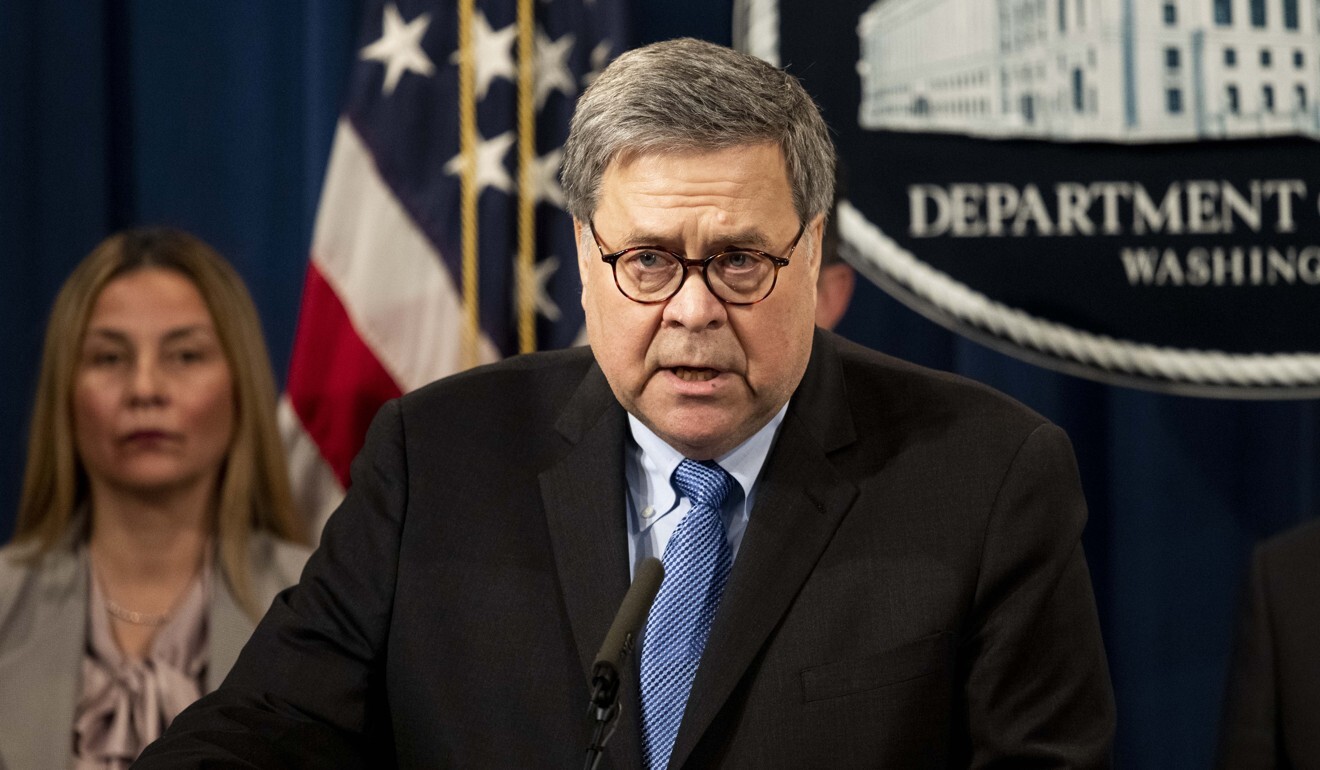
Outgoing US Justice Department officials call their ‘China Initiative’ to counter Beijing a success
- Despite collateral damage such as a chilling effect on scientific exchanges, analysts expect the Biden administration to continue the programme in some form
- Initiative’s goals include investigating trade secret theft and economic espionage and countering threats posed by Chinese foreign investment
The US Justice Department gave itself high marks in a report card released on Monday on the second anniversary of its “China Initiative”, a programme aimed at blunting Beijing’s influence in the United States.
The assessment, released as a new administration prepares to take power, comes as more Republican voices try to nudge President Donald Trump into acknowledging his electoral defeat and as Attorney General William Barr – criticised for acting more like Trump’s personal lawyer than the nation’s top legal guardian – contemplates his legacy.
“The department has made incredible strides in countering the systemic efforts by [China] to enhance its economic and military strength at America’s expense,” Barr said in the report. “While much work remains to be done, the department is committed to holding to account those who would steal, or otherwise illicitly obtain, the US intellectual capital that will propel the future.”
While legal, academic and Chinese-American groups have highlighted some of the initiative’s collateral damage, including its chilling effect on open scientific exchange and the potential demonisation of Asian-Americans, most expect it to continue in some form under President-elect Joe Biden’s administration.

04:35
‘Welcome back America’: world leaders react to Joe Biden’s victory in US elections
China’s influence operations have ramped up, safeguarding intellectual property theft is a national priority and looking soft on Beijing is hardly a good use of political capital at a time when the incoming team has its hands full with Covid-19, an economic recession and racial tension, analysts said.
The initiative was begun in early November 2018 by attorney general Jeff Sessions just days before Trump fired him for failing to block a special counsel investigation into Russian interference in Trump’s 2016 election.
The programme’s stated aims include investigating and prosecuting trade secret theft and economic espionage, better countering threats posed by Chinese foreign investment, exposing supply chain vulnerabilities and building public awareness on threats posed by Beijing.
US charges Chinese researcher with visa fraud, alleges active PLA duty
One of its problems, some legal experts said, is that its success has been difficult to quantify. “I don’t know what the measure would be,” said Dan Harris, a partner at Seattle’s Harris Bricken law firm and co-author of China Law Blog.
“They do seem to be stepping it up in terms of going after Chinese IP theft. But I feel like a lot of this stuff they’ve known about for a while and are just going after it now to look good,” Harris added. “And it seems like a lot of people are in China. It’s great they’re going after them, but they’re never going to reach them.”
Others in the intelligence community said the programme deserved credit for putting Beijing on notice that the US is paying attention to its influence operations, although a Biden administration could take steps to reduce the possibility that Asian-Americans end up being targeted.
“We are calling China out and putting actors in the US on notice that they need to take this seriously. That at least reduces the ‘attack surface’ as opposed to 10 years ago when it was wide open – industry, investment, academia,” said Joseph Kelly, president of the consultancy Pointweaver and a former Pentagon intelligence official.

Kelly said the Biden administration was likely to focus more on rules than ethnic identity relative to the Trump White House by, in part, toning down the rhetoric.
“Expect the initiative to continue under a Biden administration but with more willingness to be surgical about it as opposed to using this as a sledgehammer,” he said. “Academia and industry are good examples where we have tons of people that are either Chinese citizens or of Chinese descent that are now being viewed as inherently suspect.”
Chinese students ‘shouldn’t be in our schools spying’, Mike Pompeo says
Ron Kim, a New York State assemblyman representing a New York City district with a large Asian population, said he had a personal take on some of the programme’s excesses. His father-in-law came to the US from China as an academic, got a doctorate in anthropology at Cornell University and spent his career doing non-profit work.
“When I think of him and his core of friends constantly talking about the environment now, it’s really sad,” Kim said. “We continue to put barriers between countries for political reasons. Just because there might be one or two bad agents, it has nothing to do with the academic world overall.”

04:26
Chinese-American scientists fear US racial profiling
Among the accomplishments cited by the Justice Department in its report Monday:
- Launching 10 trade secret theft cases, five tied directly to the People’s Republic of China [PRC] government, with three defendants so far pleading guilty. “The Chinese Communist Party’s theft of sensitive information and technology isn’t a rumour or a baseless accusation, said FBI Director Christopher Wray. “The FBI opens a new China-related counter-intelligence case nearly every 10 hours and we’ll continue our aggressive efforts to counter China’s criminal activity.”
- Levelling fraud, false statements, tax, smuggling and related charges against 10 academics affiliated with US research institutions, with three convictions obtained so far. Academia remains “one of our most vulnerable sectors because its traditions of openness, and the importance of international exchanges to the free flow of ideas, leave it vulnerable to PRC exploitation”, the department said.
- Exposing six individuals studying in US universities connected to People’s Liberation Army military institutes who concealed their affiliations when applying for US visas. After the FBI stepped up investigations, “a large number of undeclared, PLA-affiliated Chinese researchers fled the United States,” the report said.
- Charging hackers working for the PLA and China’s Ministry of State Security with the 2017 Equifax intrusion and campaigns targeting biomedical companies conducting research related to Covid-19. Most of these are based in China, however, and are unlikely to face prosecution.
- Stepping up use of the Foreign Agents Registration Act (Fara), which requires foreign agents to register, to oppose Chinese influence operations, and opening a “record number of Fara investigations” and new registrations from Chinese media companies.
- Expanding efforts to thwart Chinese spying, charging two former CIA officials and two other former US intelligence officials with conspiring to supply secrets to China, with a particular focus on China’s use of social media sites to target Americans.
- Intensifying reviews of Chinese foreign investment in US strategic sectors such as telecommunications, supply chains and software.
Barr has been one of Trump‘s most loyal lieutenants, calling on federal prosecutors to pursue allegations of “vote tabulation irregularities” in the November 3 election despite no evidence of widespread fraud.
O’Brien’s remarks contrasted sharply with those of Trump, who tweeted just before midnight Sunday, “I WON THE ELECTION” even as more members of his party quietly prepare for a transition.

